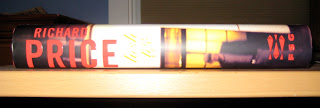Lush Life (Richard Price)

Somewhat longer version: I hadn’t read any Price before seeing him do a reading with Charles Baxter. The plot spools out from the shooting of a white kid on New York’s Lower East Side, centering on Matty Clark, the detective who ends up working the case, and Eric Cash, a waiter and perpetual failure who had been out drinking with the victim and standing next to him when he was shot. Much of the early going follows Matty and another detective, Yolanda, as they thoroughly disassemble Eric’s account of what happened in a lengthy interview that rapidly turns into an interrogation as they start turning up inconsistencies and outright falsehoods in Eric’s account of what happened.
The book is, as Price said at the reading, really a novel of place, though—the Lower East Side itself almost the main character, and the book works not just as a compelling police procedural as Matty works to solve the murder, but also as an extended exploration of the neighborhood and the people in it, from the projects kids to the roving beat cops and up to the wealthy entrepreneur Eric works for.
Plus (just to get back to the dialogue, which seriously, is first-rate), it never hurts when you can get off incidental lines like the last one here:
“Sunday night,” Berkowitz said, closing the book like a cigarette case and slipping it back into his jacket. “I’ll take care of it.”
“Sunday night going into Sunday morning?”
“Going into Monday morning.”
“Boss, we’re looking for habituals. Who’s going to be out there. Who goes barhopping on a Sunday night.”
“You want this happening or not. Saturday’s too soon. Monday I can’t promise. Tuesday’s unpredictable to the point of science fiction.”
Or, for anyone who’s ever been to open-mike poetry:
“What time are we talking?”
“Eight-thirty, eight-forty-five? They were having some kind of open-mike thing in the back room. I take a look and I see Ike at the podium, and he’s reading.”
“Reading out loud?” Yolanda asked.
Eric stared at her. “That’s what the microphone was for.”
“What was he reading?”
“I guess it was poetry because it had that pronouncement thing, you know, where you say each word like you’re angry at it?”
Hehe. So, yeah, great dialogue. If you need further convincing, he also wrote for The Wire and did the screenplay for The Color of Money, among other things. Go, read.

